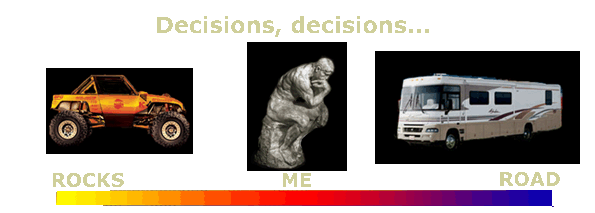WEIGHT and MASS.
That's pretty much it when we are talking about mixing 4wd trails with
long road trips. At one extreme end of the spectrum, you have the tube frame rock
buggy and at the other end you have the
Winnebago RV. Have
fun finding your place in the middle. As I have discovered, it's not
easy.
Regarding the vehicle... it's all about compromises. You will have to
make them. So, best to think about what your priorities are and go from
there, since you will no doubt have to compromise some aspect of what you would
ultimately love to have. At least this is the case if you like to
tackle really technical terrain with the same vehicle that you will live in
(or out of) for long trips. Even if you have two vehicles (or three!) you
can't drive them all on the same trip at once. (Tow vehicles aside, I am
talking about driving the same vehicle on the trail as the one you left town
in :)
In a nutshell I think these are the three main categories (each one could be
broken down and discussed at length) that you unfortunately cannot have
all of in one vehicle:
1. Light, agile and compact for the ultimate in fuel economy and power
efficiency (this means reasonable running gear and rolling profile).
2. Tough, quality modifications for the trails, such as lift, larger
tires, lockers, sliders, bumpers, skid plates, etc.
3. Creature comforts for expedition travel - shelter, food, long-range
supplies (incl. water/fuel), camping gear, etc.
As an example, my Tacoma is fairly light and compact considering what I have
it equipped with (for expedition travel), but considering what it is (a
Toyota Tacoma), it is very heavy and the power-to-weight ratio is at the
upper limits when you consider the longevity and trail capabilities of the
vehicle. When I say longevity, I am using a factory-stock truck for
comparison. Most likely, running a vehicle at the upper limits of it's GVWR
(gross vehicle weight rating) through difficult terrain is likely to have
some effect on it's potential longevity. I'm sure this is offset to
some degree by more intensive maintenance and prudent driving behavior. I
try to keep my truck in better mechanical shape than the
average commuter vehicle despite the fact that I sometimes beat the living
daylights out of it.
Something like a Uni-Mog may seem to be the obvious choice for those who want a big,
luxurious camper that will "go anywhere". But in reality, a Uni-Mog
with a big "house" sitting on the back of it is quite a huge mass
to maneuver on a tight, very difficult trail that requires lots of
articulation and movement at steep angles. Or maybe you are running a trail
with lots of overhanging trees. The laws of gravity are hard to
ignore with a vehicle like this, as well as obstructions that hang above or
into the trail. Also - think about the efficiency
of this vehicle for long trips. They require a lot of fuel. Fuel = money +
weight.
A Jeep CJ or TJ or similar type of short-wheelbase vehicle may seem to be the obvious choice for
those who crave crawling in the rocks and going anywhere there is a
challenging trail. The problem is that anything beyond a few days of travel
time will possibly find the occupants out of fuel, or supplies, and tired of
setting up the tent every night. The more you build a vehicle like this to
reach it's full trail potential, the less accommodating it becomes for long
trips. If you try to load it with gear and supplies, the power-to-weight
ratio is hampered. If you lift it too much and fit it with huge tires and
super-flexy suspension, it becomes too specialized for highway efficiency
(and safety?).
Somewhere in the middle (full-size truck/camper) is going to be compromising
too, because now you lose the sheer brute strength of something like the 'Mog when you
consider all of the weight that must be managed on a difficult trail, not to
mention a big heavy rig like this simply cannot do some of the trails that a
smaller 4x4 could. Weight and mass relate directly to traction. And again, the efficiency of the vehicle is less on a
long trip (diesel would help). However, you can certainly travel MUCH more
comfortably in a setup like this, so the time you are off of the difficult
trails will be very pleasurable (i.e. general exploration on moderate
roads/trails). This type of setup bears some consideration if the owner is
not as interested in highly technical trails.
What about off-road trailers? They are wonderful. A very clever way to
move your camp and equipment around and bring lots of stuff that you
couldn't fit in/onto your vehicle. I have a friend who owns one, and he
tells me that they aren't so great when you need to back up. This is
definitely something to consider if you will be traversing a very tight
trail (including switchbacks for example), or one that might require you try
different lines over an obstacle. Trailers can also present a liability to
balance and traction depending on the situation. They can create more work
for your vehicle when it is fighting for traction.
In summary, I must say that I am by no means an expert on this subject.
Hardly, in fact. My experience with vehicle dependant travel has been
limited to only a small spectrum of all of the real-world conditions and
trails that exist across the globe. I still have so much to learn. I am
simply offering some thoughts on what I have experienced and thought about,
based on my own experiences thus far.

